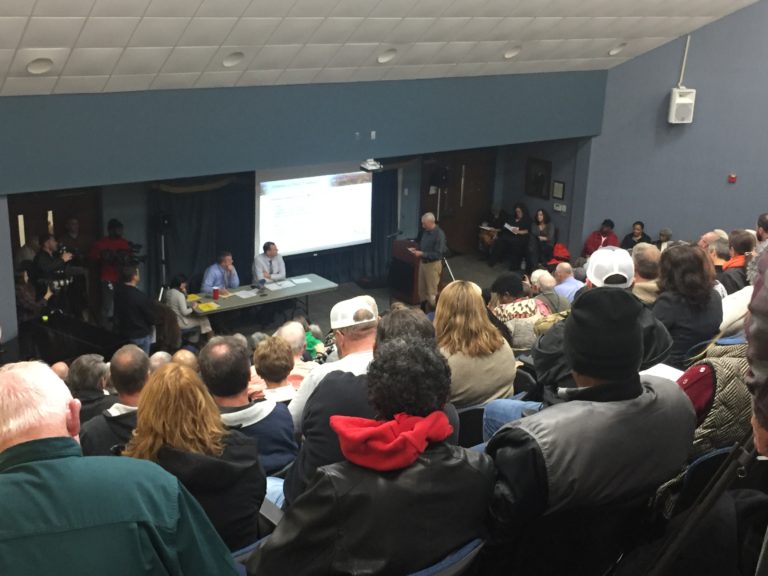North Carolina Waterkeepers Mobilize Communities Against Hog Waste
By: Will Hendrick

How can a state manage 9.5 billion gallons of hog waste each year?
That’s the question North Carolina has been grappling with for more than 20 years. The state, officially, revisits the question every five years, when it renews the Swine Waste Management System General Permit. This permit governs how waste is managed at all but a few of the state’s roughly 2,200 industrial animal operations, which annually raise 10 million hogs.
With the permit up for renewal this year, North Carolina’s Waterkeeper groups held informational meetings, rallied their supporters to attend public hearings, wrote op-eds for local papers, and issued action alerts mobilizing members to submit comments to the state decisionmakers drafting the permit.
Crystal Coast keeper Larry Baldwin says DEQ has not been acting in “good faith” in permit process. pic.twitter.com/ONzsrZm9vR
— The Dirt (@TheDirtFM) February 20, 2019
Next @LunaBlume notes that Smithfield is not doing right by residents or their contractors and employees when better technology exists and is affordable. pic.twitter.com/brXTQiZ6xk
— The Dirt (@TheDirtFM) February 20, 2019
Clean water advocate @UpperNeuseRK speaks: pic.twitter.com/5wHRr11WuM
— The Dirt (@TheDirtFM) February 20, 2019
Will Hendrick of @Waterkeeper joins the chorus of commenters demanding stricter reporting and transparency for swine operations: “If you’re compliant with your permit, then you have nothing to hide.” pic.twitter.com/4ffuZOtVDS
— The Dirt (@TheDirtFM) February 20, 2019
All of North Carolina’s Waterkeeper groups also signed a detailed comment letter to the state’s Department of Environmental Quality, submitted earlier this month, about the permit. We asked the state to:
- Increase accountability for the hog industry by expanding requirements for groundwater monitoring and the use of a tool that measures the risk of nutrient pollution.
- Ensure equity by developing a robust environmental justice mapping tool, which will identify the communities suffering most from the industrial hog operations, and using it to require permitted operations to mitigate disparities in cumulative impacts.
- Promote transparency by requiring permitted operations to disclose records detailing where, when, and how much hog waste they generate.
- Clarify that operations that add waste digesters or covers to their swine waste cesspools are not eligible for coverage under the general permit.
- Require the use of automated technology that ensures compliance with the permit’s terms.
A chief failure of the draft general permit is that it endorses the continuation of the “lagoon and sprayfield system” used to manage waste at industrial hog operations. This system involves keeping swine waste in giant cesspools, then spraying it onto nearby cropland.
This outdated system is a cheap way for hog producers to manage waste, but it costs North Carolina an uncounted fortune: Toxic emissions from industrial hog operations foul our air, contaminants from hog feces and urine pollute our waters, and neighbors of industrial operations live shorter lives.
More than 20 years ago, an expert commission created by the North Carolina General Assembly declared that the extended and exclusive reliance on this system of cesspools and sprayers threatens North Carolina waterways and should be discontinued.
While we’ve worked this year to make the permit governing waste more protective of our neighbors, and our waterways, we did so knowing well that it is past time for the state to end the permitting of this inherently risky system.